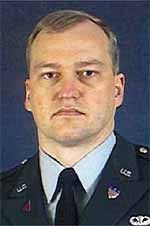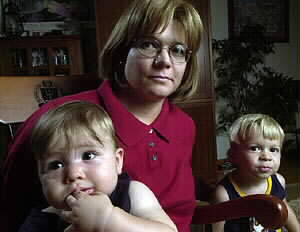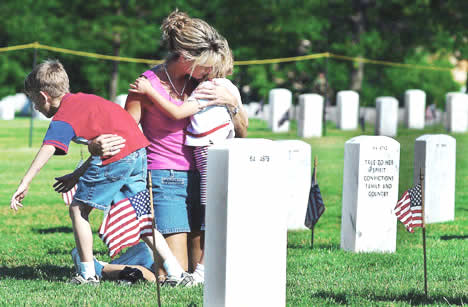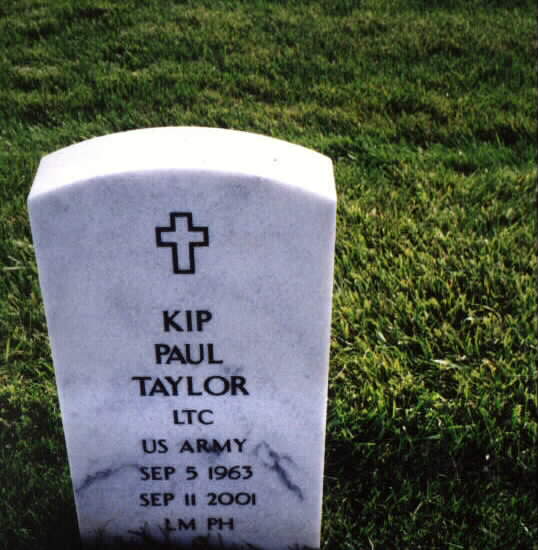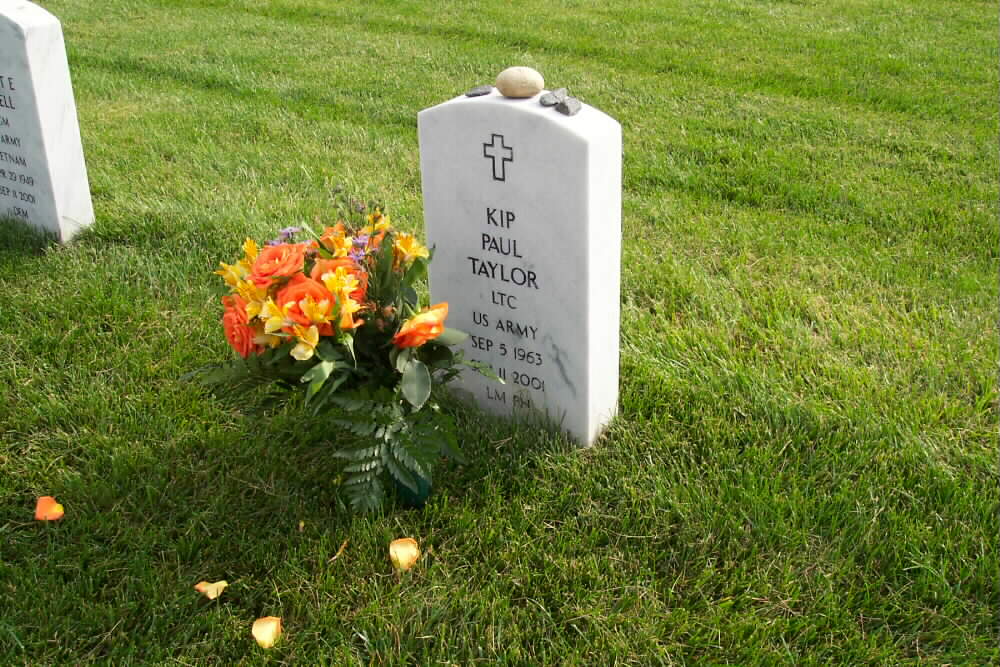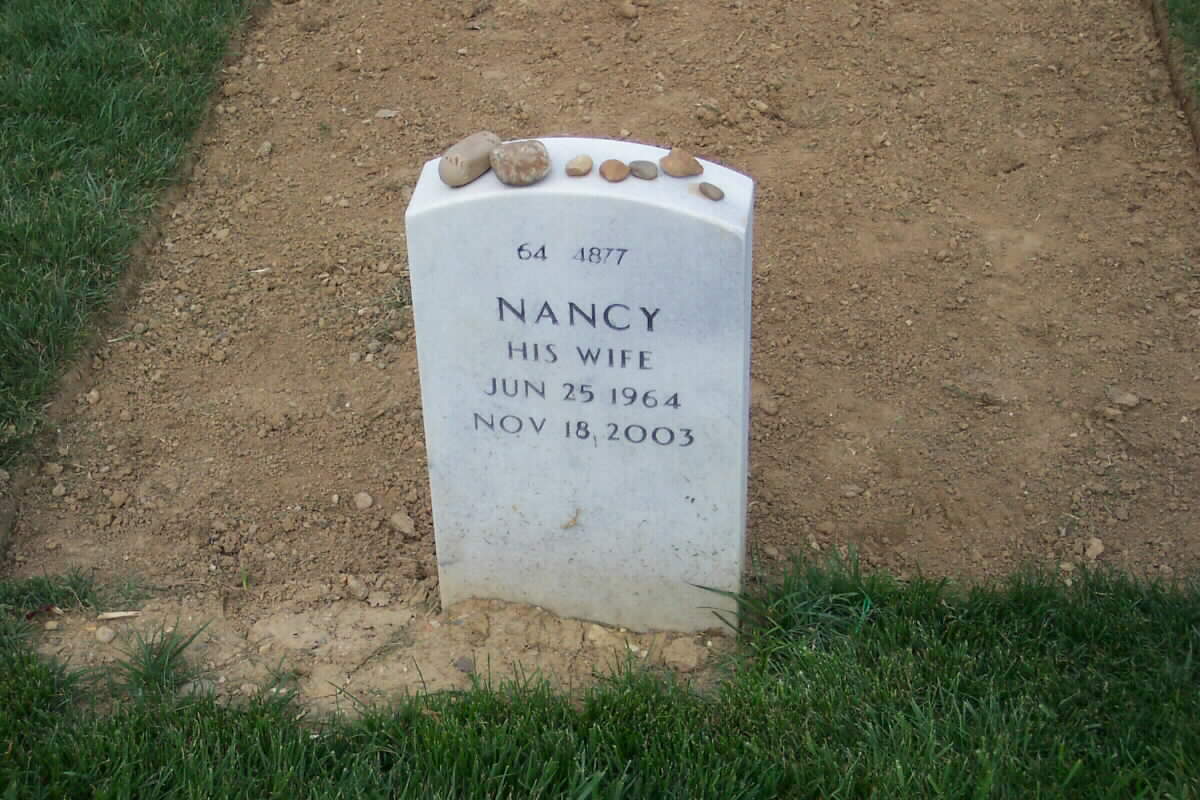Kip Paul Taylor
Attack Location: Pentagon
Age: 38
Home: Michigan
Lieutenant Colonel Kip Paul Taylor’s 16-year ascent through the Army ranks began when he received his commission from the Reserve Officers Training Corps at Northern Michigan University, a unit run by his father, Don.
A few months after graduation, Taylor was shipped to a base in Nuremberg, Germany, where he served for 3 1/2 years. The Michigan native returned stateside at the end of 1989 for a 15-month stint as an instructor at Fort Benjamin Harrison in Indiana. He was again sent on a foreign tour in 1991, this time
as an adjutant for a task force in Honduras. After that five-month assignment, he rose to commander of a troop brigade back in Indiana, where he remained until the summer of 1994.
Taylor moved from base to base for four years before arriving at the Pentagon as executive officer in the Army’s Office of the Deputy Chief of Staff for Personnel in July 1998. The 38-year-old career serviceman — who enjoyed running, basketball and golf in his free time — was serving as a military assistant in that office when he was killed September 11, 2001.
“His office was on the outside ring and took a direct hit,” Taylor’s sister, Ann Zaenglein, was quoted as saying in USA Today. “There was nothing left of his office.”
A Major at the time of his death, Taylor was posthumously promoted to Lieutenant Colonel. He is survived by his wife and son.
The joys and trials of new fatherhood were on KipTaylor’s mind. At 8:26 a.m. on September 11, 2001, he e-mailed friends from his office in the Pentagon about how his life had changed since the birth of his son, Dean, almost two years earlier. He was happily anticipating the birth of his second son in a month.
“After kids, there are days that just get going when you say, ‘Hi honey, I’m home wrote the U.S. Army Major. “My conclusion is that what we do until that moment pales in comparison to what we do after that point in the day.”
At about 9:40 a.m., Taylor, 38, was killed when American Flight 77 hit the Pentagon.
“We were very happy, about as happy as we had ever been in our married life,”
said his wife, Nancy. “I guess it’s better to be taken when you’re happy than when you’re not. But it doesn’t make it any easier.”
The Taylors were happy because they had achieved something that earlier
seemed impossible. After their attempts to conceive had failed, the couple
turned to medical science to help them have children. Dean was the result of in
vitro fertilization, as was Luke, born October 25.
The babies are a great source of comfort. “I can’t imagine if I had gone through the IVF two times and it had not been successful, and then lost my husband,”Nancy Taylor said.
So, when her husband’s friends and admirers started asking where they could donate money in his memory, the answer seemed obvious. Nancy Taylor started a charity for infertile military couples and called it the Kip P. Taylor Fund. She
explained that there are only two military facilities worldwide where in vitro fertilizations are performed, one in Washington, D.C., and one in Texas, making it difficult for military couples stationed abroad or elsewhere in this country to receive the subsidized treatment.
“It’s a lot,” Nancy Taylor said. “But it’s not enough to sustain this.”
Having children is a challenge for military couples, she said, with being stationed in various places, long absences and combat service. But children play just as important a role in military families as they do in any other community, she said.
“The military community does really rally around its children.”
To Taylor, balancing his work with a home life was essential. Though the 6-foot-5 Major cut an imposing figure in uniform, he was just as happy in jeans, cooking on his outdoor grill, building a deck on the couple’s McLean, Virginia, home or tending to the lawn. But most of all, his wife said, he loved fatherhood and couldn’t wait to someday coach his sons’ Little League teams and attend their music recitals.
Without him, his wife said, she tries to enjoy the “blessing” of her sons. But it’s hard. She has not yet felt ready to return to her job as the editor of a medical newsletter.
“At first I was getting by hour to hour,” she said. “Then it was day to day. Now it’s week to week. I hope some day it will be month to month. But it will be a while.”
Six weeks after losing her husband Sept. 11,
their second son was born
Nancy Taylor with sons Luke, 10 months, and Dean, nearly 3. Taylor’s
husband, Army Lieutenant Colonel Kip Taylor, was killed in the Pentagon attack
a month before Luke was born.
As Nancy Taylor endured the physical pain of childbirth October 25, 2001, at Bethesda Naval Medical Center, Maryland, she also struggled with powerful emotions and memories.
Just six weeks earlier, her husband, Army Lieutenant Colonel Kip Taylor, was killed in the September 11 attack on the Pentagon.
“It was hard,” Taylor said. “I had been there at Bethesda less than two years before, when I had Dean. I kept recalling what it was like when Kip was there.”
Kip’s sister and sister-in-law were with her during the delivery, which was a comfort. But still, “It didn’t seem right that Kip wasn’t there,” she said. “It was horrible.”
The approaching anniversary of the attacks has been an emotional time. She often thinks about what she, Kip and Dean were doing a year ago, including a trip to the beach a few weeks before September 11.
When she looks at Dean, who turns 3 on Decmber 28, 2003, she sees his resemblance to Kip. Baby Luke, who just started crawling, looks more like her.
“The kids are my saving grace,” she said. “They keep me busy. It’s not that I don’t think of Kip every day, because I do.”
Kip Taylor was the military assistant to the Army deputy chief of staff for personnel, Lieutenant General Timothy Maude, who also was killed in the attack.
Taylor decided the best way to honor her husband’s memory was to help military families like hers who need fertility treatments to conceive. Both her boys were conceived through in vitro fertilization at Walter Reed Army Medical Center in Washington.
She has established a fund to help military couples with travel and lodging expenses while they receive fertility treatments at Walter Reed or at Wilford Hall Medical Center in Texas.
The fund has paid the expenses for five couples so far, she said. At least one of the five has been successful in getting pregnant.
The Kip Taylor Memorial Fund covers some expenses for ROTC students at Northern Michigan University in Marquette, which Kip attended on ROTC and basketball scholarships.
Taylor collects letters, pictures and other memorabilia from generals, drill sergeants and others who worked with Kip and from schoolchildren who wrote to her after September 11.
She has been overwhelmed by the generosity of those who wrote and sent gifts, many of them strangers. She has tried to respond to everyone.
She points to a picture of President Bush embracing her September 17, 2001, at the Pentagon as he toured the rubble.
It was a chance encounter – she was there only to pick up Kip’s car from the parking lot. As her escort officer walked her through the building, Bush, who was there for a memorial service that had just concluded, appeared in the hallway with his large security entourage.
“We were told to move to the side of the hallway,” Taylor said. “Everyone lined up started applauding, and he stopped and began shaking hands.”
Taylor approached, holding a picture of her husband that she was carrying, and told Bush that Kip had been at the Pentagon on September 11 and was still missing.
Bush talked to Taylor for “a good two minutes,” then embraced her and urged her to take good care of herself and her baby.
Now, almost a year later, she finds that the biggest changes in her life are “the littlest things.”
“Kip’s absence is constantly evident,” she said. “It’s so different, not having him here to call and talk to during the day. Not seeing him in the house, not hearing his voice is just a huge void. It’s an unspeakable loss.”
It has changed her perception of time. “I think time passes quickly when you have something to look forward to. Not that I don’t have something to look forward to, but I guess my life is just not normal,” she said.
“Having no contact with Kip for a year, I feel like I haven’t talked to him in years.”
Looking ahead, she focuses on her boys and their view of their father. She talks to her children about him often, showing them his picture. “I hope they think about their dad in a happy, positive way, and not let the sadness overcome his memory,” she said. “I’m trying to overcome that myself. At night, we pray for daddy, mommy and the whole family.”
In the first year of Dean’s life, she put together a time capsule for him that includes audiotapes with messages from Kip and other family members. She hasn’t listened to Kip’s tape.
When he was recording it, he asked, “You’re not going to listen to this, are you?” she said.
She knows he would want his children to be aware of how much he loved them: “He wanted them to be happy and have a good life.”
Now she’s gathering items for a time capsule for Luke. But that effort is moving slowly.
“I find it hard to ask people,” she said. “There has been so much sadness in the family.”
That sadness lingers. These days, Taylor can think of Kip and find herself smiling. “But more times, I’m crying.”
Family tragedy ends in Arlington Cemetery
By JOSEPH L. GALLOWAY
Courtesy of Knight Ridder Newspapers
WASHINGTON – When Nancy Melvin Taylor died of cancer last week (18 November 2003) at the age of 39, it was the final act of a family tragedy that began on the morning of September 11, 2001.
When they bury her at Arlington National Cemetery, she will rest in the same grave with her husband, Army Lieutenant Colonel Kip P. Taylor, 38, who was killed in the terrorist attack on the Pentagon. Husband and wife will share a simple white marble marker in Section 64.
Two years ago, Kip and Nancy Taylor were living a dream. They’d struggled for years to have a child, and finally through in-vitro fertilization Nancy had given birth to a son, Dean Ross Taylor. She was eight months’ pregnant, and their second child was due in October.
At 8:26 a.m. on September 11, in his office in the Pentagon, Kip sent this e-mail to friends about the joy of fatherhood: “After kids, there are days that just get going when you say: Hi honey, I’m home! … What we do until that moment pales in comparison to what we do after that point in the day.”
At 9:40, terrorists steered American Airlines Flight 77 into the offices of the Chief of Personnel of the Army, killing many of those who worked there, including Kip Taylor.
Nancy said: “We were very happy, about as happy as we had ever been in our married life. I guess it’s better to be taken when you’re happy than when you’re not. But it doesn’t make it any easier.”
Six weeks later, on October 25, 2001, Nancy gave birth to their second son, John Luke Taylor. While she was in the hospital, bringing a new life to this world, the doctors discovered that Nancy had cancer. Terminal cancer.
Nancy packed as much living as she could into the precious months that were left to her.
She established a charity for infertile military couples, helping to pay their way to the only two military facilities where in-vitro fertilizations can be performed. The Kip P. Taylor Memorial Fund helps offset travel, lodging and food for military couples traveling to the hospitals. (Donations to: Kip P. Taylor Fund, P.O. Box 185, McLean, Virginia 22101.)
She loved and cherished her babies full-time, even as she wrestled with her grief over the loss of Kip Taylor, a 6-foot-5 Michigan native who came into the Army with an ROTC commission at Northern Michigan University in a program run by his father, Don.
Nancy said her husband had loved fatherhood and couldn’t wait for the day he could coach his sons’ Little League baseball teams and attend their band concerts.
On October 10 of this year, Nancy was inducted into the University of Rochester’s Athletics Hall of Fame. She’d been a regional All-American in field hockey while attending the Nursing School at the university. She was, her coach said, “by far the best offensive player in school history.”
What will happen to two little boys, orphaned at ages 4 and 2? Kip’s brother Dean and his wife will care for them – and the Special Operations Warrior Foundation will ensure that Dean Ross Taylor and John Luke Taylor will have free college educations, everything included, in token of the fact that their father served a tour as adjutant of the Army’s top-secret Delta Force.
If you’re looking for a worthy charity this holiday season, you might consider the Warrior Foundation (www.specialops.org), which was created in 1980 as the Colonel Bull Simons Scholarship Fund (named for Colonel Arthur D. Simons, a legendary special-ops officer who died in 1979) to provide college educations for 17 children of nine American soldiers who were killed or disabled in the Desert One mission to rescue American hostages in Iran.
That fund and others supporting Special Ops troops and families merged and became the Warrior Foundation in 1995. Its purpose is “to provide a college education to every child who has lost a parent while serving in the Special Operations Command during an operational or training mission.”
The Warrior Foundation provides grants, not loans. It covers tuition, books, and room and board. To date, 48 children of Special Ops soldiers have graduated with this help. More than 400 children of 380 Special Ops personnel who have died in service to our country are guaranteed the assistance. That will cost $25 million through 2010. The Warrior Foundation has $3.8 million in the bank.
Kristen Laufenburg stays close to her son, Gray, and her daughter, Chaise, as
they visit the grave of Lt. Col. Kip P. Taylor, a friend of the family who was
killed at the Pentagon. The Old Guard placed flags on the graves at Arlington
National Cemetery. Mrs. Laufenburg’s husband is Col. James Laufenburg,
commander of the Old Guard.
NOTE: Colonel Taylor was laid to rest in Section 64 of Arlington National Cemetery, in the shadows of the Pentagon.
Michael Robert Patterson was born in Arlington and is the son of a former officer of the US Army. So it was no wonder that sooner or later his interests drew him to American history and especially to American military history. Many of his articles can be found on renowned portals like the New York Times, Washingtonpost or Wikipedia.
Reviewed by: Michael Howard

